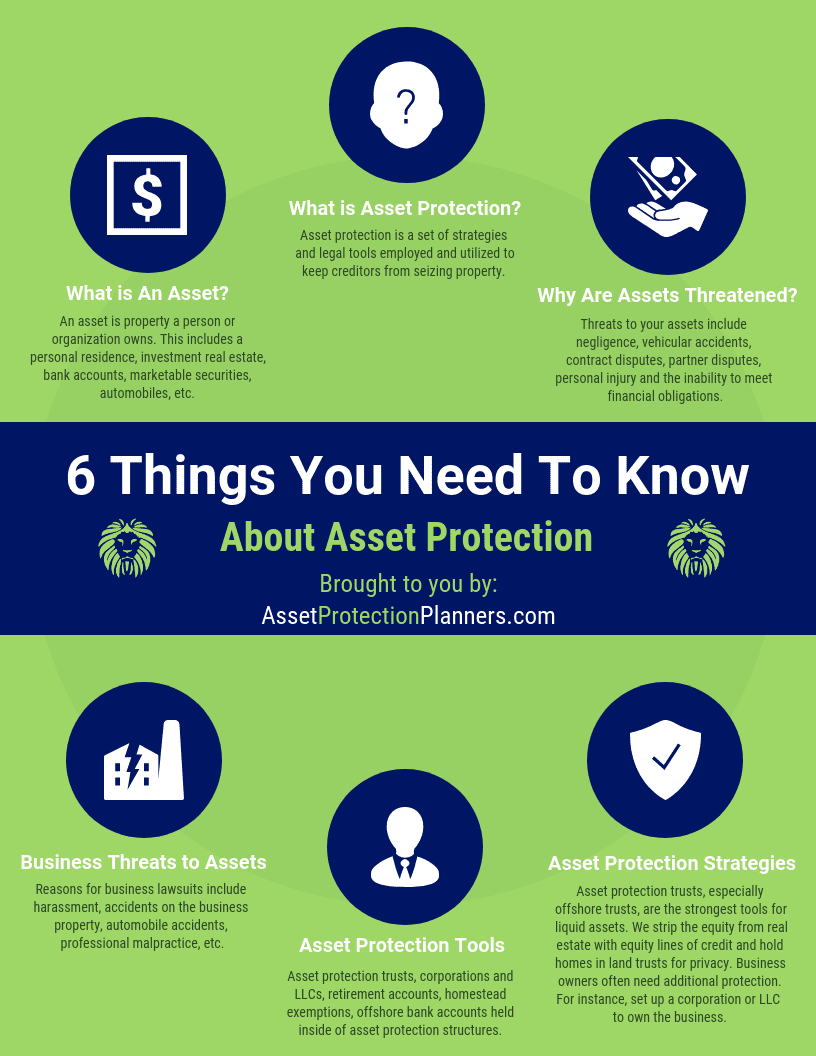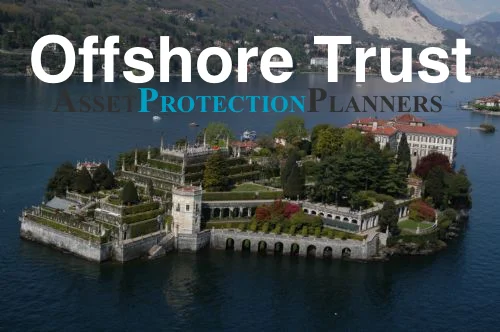
Asset protection planning is a set of legal strategies to protect assets from creditors, divorce, lawsuits or judgments. This involves a series legal and lawful techniques that can deter a lawsuit. In addition, it can provide you with settlement negotiation power. Most importantly, it can help prevent the seizure of your assets in the event of a judgment. Examples include establishing asset protection trusts, privacy trusts, LLCs and equity-stripping strategies. Many plans include offshore elements in countries where the laws are more protective than they are locally.
At the core of any asset protection plan is a professional and legal examination. Thus, an expert can assess one’s financial situation, assets, risks as well as personal or family goals.
There is a variety of legal techniques you can implement that provide a range of protective features. This can be from simple financial privacy all the way to judgment-proof asset protection such as an offshore trust. The planning is tailored to the assets, risk and comfort level of the individual or family seeking protection. There are resources to help you such as this article on the 5 Steps to protect assets from lawsuits.
Wealth Protection: When to Act?
If you think (or know) that someone is going to sue you, do not wait any longer. Look into your options immediately. That is, the sooner you act the more favorable the outcome will be.
Now, to maximize its effectiveness, planning should take place before the need arises. However, there are options that provide asset protection after a lawsuit is filed. As Shark Tank investor Kevin O’Leary says, asset protection is a grand form of financial insurance. Ideally, one should implement it well in advance of the need for it in order to avoid a fraudulent conveyance ruling. (Keep in mind fraudulent conveyance is generally a civil matter, not a criminal one.) Nevertheless, plans are much more effective for debtors who have the foresight to set them up in before a lawsuit strikes. So, get complete information to understand your needs, but once you do, take action.
Strongest Jurisdictions for Asset Protection Planning
Asset protection planning is creating a complete financial plan taking one’s entire situation into perspective. The legal and financial vehicles used range from insurance policies, state homestead protection laws, business vehicles and estate planning instruments. This often includes multiple legal jurisdictions. This means setting up entities in foreign countries where the laws are more favorable to the defendant or debtor. This can also keep assets out of the grasp of a determined, results-oriented local court. Two of the most powerful examples of these tools are the Cook Islands trust and the Nevis trust. As such, our international law firm beyond the reach of your local judge, can step in to protect you.
These concepts are designed to deter a legal opponent from pursuing you. They should make it difficult or impossible, for someone to take your assets in a lawsuit when a judgment strikes. With proper planning an individual can protect his or her lifetime of accumulated wealth; including savings, real property, investments, even future income. For example, here is an article entitled Five Legal Tools to Protect Your Assets from Lawsuits that discusses some specific strategies.

Asset Protection Planning Benefits
Here is what happens when you establish a proper asset protection plan. Your legal opponent or creditor recognizes that you are not an easy target. Little to no assets are within reach of a judgment. This puts the debtor in a powerful position. Markedly, this can deter a lawsuit, or in the event of a lawsuit or litigation, provide substantial negotiation leverage.
By the way, don’t expect your lawyer to jump up and down with excitement. He likely won’t tell you to run out and protect your assets. He will be too worried about what that judge will think about him. Keep in mind, your attorney might bring 25 more cases before that judge. He doesn’t want to be that guy with client who took the control out of the judge’s hands. Hence, it’s usually concern for himself, not you.
So, to enjoy the benefit of peace of mind, hire one attorney to defend you. Then hire another attorney who specializes in asset protection to protect you. We have attorneys and consultants on staff who have expertise in asset protection. You can call and discuss your needs or fill out a free consultation form on this page.
Financial Privacy
One of the first benefits of implementing certain legal vehicles to protect assets is privacy of ownership. You can hold real property in land trusts. You can hold other forms of wealth privately in international LLCs, for example, therefore reducing your “visible” net worth. This can reduce the risk of frivolous lawsuits or a predatory legal attack.
When a contingent fee lawyer reviews a case, he will perform a public records search. He will look for available assets that he can quickly and easily liquidate to satisfy a judgment. Having no assets tied to your individual name drastically reduces the chances of a lawyer taking the case. Thus, it provides, lawsuit deterrence.
In summary, what do you do? Hold investments, savings, property, business income and real estate privately. You do so by owning such assets in the proper variety of legal vehicles and business entities.
Lawsuit Avoidance
Lawsuits and litigation are expensive. In fact, they are financial vampires. When you protect your assets through a well-thought-out plan, quite simply, there is less to lose. This is the equivalent of taking your chips off the table when your stakes are high.
As you know, the only real winners in a lawsuit are the lawyers. Even if you win a lawsuit, you are still out your own legal expenses. They can even be substantially higher than the lawsuit, itself. Preventing a lawsuit is more important that winning a lawsuit. Asset protection planning is a key measure that can prevent you from being involved in a long, drawn-out legal battle.
Judgment Proofing
The final straw in any plan to protect assets is this. Did it prevent of the seizure of your assets? Achieving this may require powerful international legal tools, such as an offshore trust. Why, because a determined lawyer and results-driven judge can penetrate just about any domestic asset protection plan. So, your resolve needs to be even stronger. What do you do? Remove your assets from the reach of your local court. Using powerful offshore structures can help you do just that. Thus, it places your assets beyond the grasp of your creditor.
Don’t be fooled into thinking that the only safe place for your money is back home. It’s not. According to attorney Jay Mitten, the US has 80% of the world’s lawyers and 96% of the world’s lawsuits. The risk of losing assets from litigation in the US is far greater than in other countries.
What about bank safety? Of the 50 safest banks in the world, as of this writing, only four of them are US-based. Moreover, all them are on the bottom half of the list. All four of them happen to be tiny farming banks. There is not one national US bank on the list. That’s right, not one. So, the safest banks in the world are located outside the US, not inside.
Now, keep in mind, an international bank account alone won’t do the trick. Otherwise, the judge could just force you to bring the money back. You’ll need a combination of the proper legal tools in conjunction with the right international institution.
Types of Planning

Asset protection planning can be very broad in scope. It starts small, such as carrying auto insurance. It can also include multiple legal tools and business entities using local and foreign jurisdictions. The choices depend on the protection needs, risk and comfort level of the individual.
The primary vehicles for estate and asset protection planning are as follows:
- asset protection trusts
- privacy trusts (such as land trusts and title holding trusts)
- limited liability companies (LLCs)
- foreign corporations and LLCs
- equity stripping
Domestic Asset Protection Planning
How about domestic asset protection tools? Well, does the case law show? It shows that there are a few good options that provide protection in one’s home jurisdiction. The introduction of domestic asset protection trusts (DAPTs) is a relatively recent concept in the U.S. Such legal entities can provide mid-level protection for property owners, physicians, small business owners and provide protection against internal liability.
The problem is, as many attorneys will attest, many judges are insistent on getting their predetermined result. Therefore, we repeatedly see them set the law aside and seize the assets of domestic asset protection trusts. This is the consistent result we see. When you put assets into a trust is in one state, and the trust settlor lives in another, the results are bleak. For example, we do not know of one case where a Nevada asset protection trust has protected a California resident.
“You’re here. The assets are here. I’m going to let your creditor seize them.” Signed, your friendly neighborhood judge. In such instance, there is very little a domestic trustee could do but comply.
Offshore Asset Protection Planning

The most effective asset protection plans involve a combination of international legal entities and financial institutions. Nevis and the Cook Islands are some of the safest and strongest offshore trust jurisdictions in the world. What’s the best way to completely bulletproof the protection of assets? Remove them from your local legal jurisdiction. The countries mentioned here do not recognize foreign court orders. So, what do you get when you move your assets to a legal jurisdiction outside of your domicile? You also place them outside of the reach of legal predators. Placed in the proper vehicles, such as the offshore trust and LLC, you get the utmost in legal protection.
These foreign jurisdictions cater to investors seeking safe harbor. Many of them offer tools to shield wealth using legal statutes that strongly favoring the debtor. Corporations, LLCs, trusts, banking as well as investment accounts are available to diversify and secure one’s financial holdings.
What about safety? The Corruption Perceptions Index (CPI) currently names New Zealand as the number one safest, most trusted jurisdiction in the world. What is Cook Islands a part of? New Zealand. The US is currently in 27th place.
The conclusion? The most protective laws in the world, the most flexible legal systems and investor-friendly laws are in offshore jurisdictions. We use legal tools in countries with longstanding case law histories of protecting assets from lawsuits.
Who Should Plan?
Anyone with something to lose should at least consider protecting it. Most people are under the impression that asset protection planning is strictly for high-net-worth individuals. However, the contrary is also true. Here is best illustration of this. Let’s compare a judgment of $350,000 to a multi-millionaire and a family with a modest home, savings and income. In the case of the millionaire the judgment is a fraction of the total net worth. However, in the case of a family, it could be about all of it. So, who should consider creating an asset protection plan? Both.
Taxation
Asset protection vehicles are usually tax-neutral entities. As such, income tax responsibility passes through to the taxpayer. There may be tax-saving measures that you can implement. But commonly, protective planning is tax-neutral.
Personalized Planning

Asset Protection Planners offers a personalized approach to your planning needs. Therefore, our attorneys and consultants take our clients by the hand and guide them in the right direction. Furthermore, we inform and educate them and their attorneys on available options. That way, they can make confident decisions throughout the planning process. This area of law is not one in which professionals need to get excessively creative. We have understanding of the laws and features of these legal instruments. This knowledge helps us to properly implement the right tools and appropriate combinations of legal vehicles. Accordingly, we use strategies that are proven to work in similar situations; ones that are backed by solid case law.
Learn More about Asset Protection Planning
- 5 Steps for Asset Protection from Lawsuits
- A Lawsuit Story: A Case for Asset Protection
- Assessing Your Risk
- Asset Protection Law
- Asset Protection Planning 101
- Asset Protection Planning Strategies
- Does Asset Protection Work?
- Homestead Exemptions by State and Territory
- How to Start an Asset Protection Plan
- Important Asset Protection Planning Considerations
- Legal Asset Protection Planning
- Long Term Nest Egg Protection
- Risk Assessment
- The Real Truth About Asset Protection Planning
- Top 5 Asset Protection Tips
- Wage Garnishment Exemptions
- What Is an Asset Protection Plan?
- Community Property States
- If Someone Sues You, Can They Take Your House?
- IRA Creditor Protection by State
Asset Protection FAQ
What does asset protection mean?
Asset protection means employing strategies and establishing legal tools to shield one’s assets from the claims of creditors. Both individuals and companies, use asset protection. They use it to restrict creditor access to property of value within the confines of creditor-debtor law.
What is the best way to protect assets?
Here is a list of the best ways to protect assets:
1. Land trusts for privacy of ownership.
2. LLCs for asset protection and lawsuit protection.
3. Corporations to shield personal assets from business lawsuits.
4. Equity stripping which encumbers assets and reduces their value.
5. Offshore asset protection trust, which is the best way to protect assets that are liquid.

Why Is Asset Protection Important?
Asset protection is important. After all, it reduces the risks of losing the property you have accumulated through your time, knowledge and labor. Assets can provide financial security. Furthermore, financial security provides peace of mind. It gives you the ability to provide food, clothing and shelter for yourself and those you care about. So, protecting assets is important because gives mental and physical refuge. It provides security not only for yourself but those who depend on you to provide for them financially.
What Is Asset Protection Planning?
Asset protection planning is taking legal steps to protect your assets from creditors. This may, for example, include lawsuits, judgments, divorce, and business disputes. Plans to protect your assets can include establishing asset protection trusts and limited liability companies. Additionally, it can also include encumbering property to strip its equity, then placing the proceeds into protective structure. As such, one can prevent assets seizure when a judgment strikes. Plus, it improves one’s ability to negotiate a favorable settlement.
Call or fill out a free consultation form on this website.




